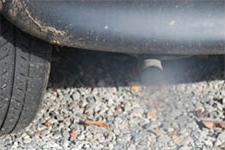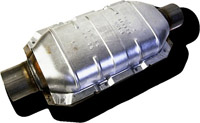
A catalytic converter (“cat”) is an exhaust emission control device which chemically - - using a catalyst - - converts toxic compounds of car exhaust into harmless compounds. The result is a reduction of pollutants exiting the car's exhaust.
Catalytic converters have been standard since the mid 1970s.
What Is A Catalyst And How Does It Work?
A catalyst is a substance that causes or speeds up a chemical reaction without being affected by it itself. In a catalytic converter we usually find two different kinds of catalysts:
- Reduction Catalyst – First step of catalytic converter which helps to reduce the Nitrogen Oxide (NOx) emissions.
- Oxidation Catalyst – Second step of catalytic converter, it helps to minimize the Hydrocarbons (HC) and Carbon Monoxide (CO) emissions.
Inside of the catalytic converter the catalysts - - palladium, rhodium, and platinum - - are coated onto a ceramic honeycomb or bead which then is placed into a muffler-like metal housing.
Three-Way Catalytic Converters
You might come across the term “Three-Way Catalytic Converter” when you research catalytic converters or you talk to your auto shop about replacing a catalytic converter. “Three-Way” refers to the fact that most modern cats convert the three main pollutants (NOx, HC, and CO) of car exhaust into less poisonous gases.

Where Does The Catalytic Converter Go?
In most cars the catalytic converter can be found between the exhaust manifold and the muffler which is located on the underside of the car, usually underneath the passenger seat.
Catalytic Converter Failure
Catalytic converters can get clogged for various reasons. The following symptoms may indicate a (partially) clogged catalytic converter:
- Check Engine Light - may indicate a catalytic converter failure
- Poor Fuel Economy – a noticeable drop in gas millage
- Poor Performance - car does not accelerate when stepping on the gas pedal
A totally clogged cat will cause an engine failure within a few minutes because of high exhaust back pressure.
If you suspect a problem with your catalytic converter bring it into a nearby muffler shop.
Catalytic Converter Thefts
The three metals (palladium, rhodium, and platinum) used in the catalytic converter are valuable which lead to an increasing number of cat thefts in recent years. Find out how to prevent your catalytic converter from getting stolen and learn more about cost-effective catalytic converter replacements.
What is a Catalytic Converter
In short, a catalytic converter is the most important emissions component of your car or truck's exhaust system. It removes toxins from your vehicle's exhaust. They are standard on most cars and required by law. If you suspect a problem with your catalytic converter, call either Ripley's location for a low-cost replacement or repair.